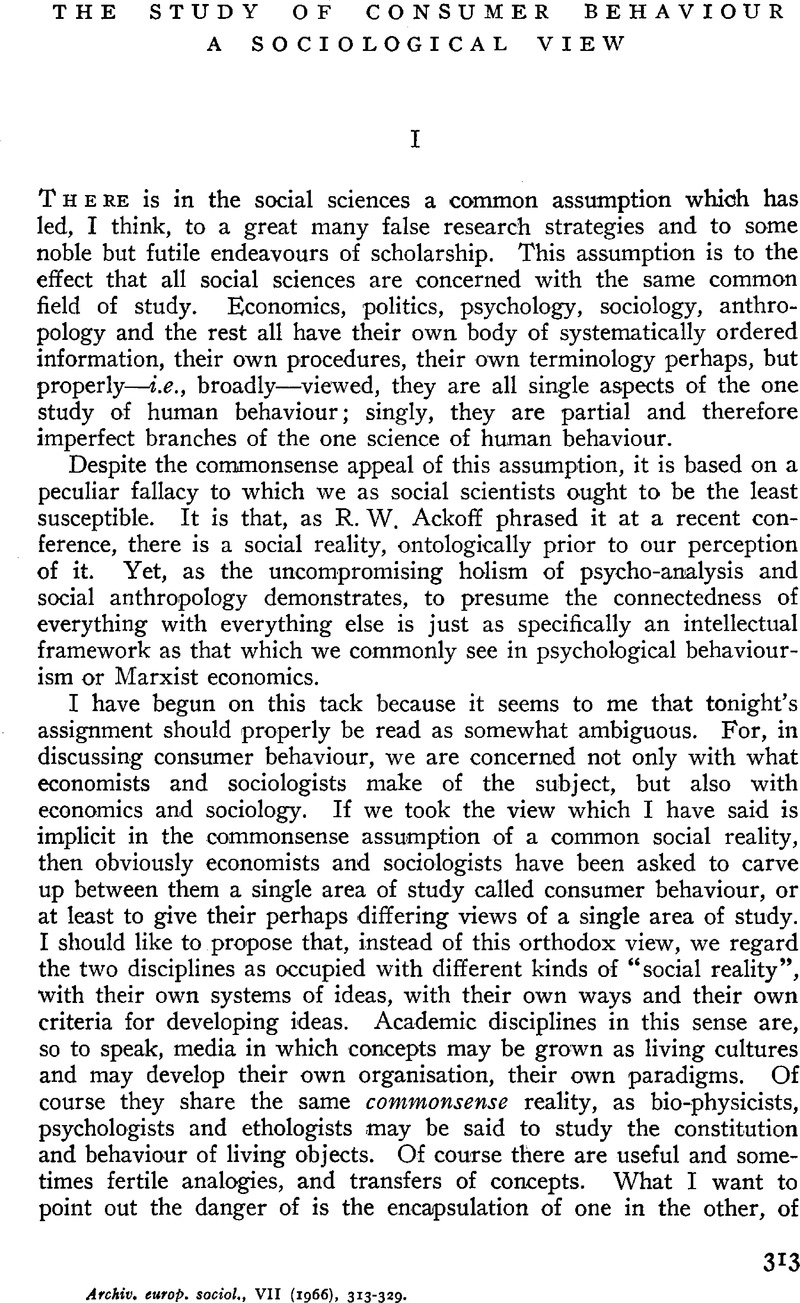Published online by Cambridge University Press: 28 July 2009

(1) Keynes, J.M., General Theory of Employment, Interest and Money (London, Macmillan, 1936).Google Scholar
(2) Duesenberry, J.S., Income, Saving and the Theory of Consumer Behaviour (Cambridge, Harvard University Press, 1949).Google Scholar
(3) Katz, E. and Lazarsfeld, P.F., Personal Influence (Glencoe, Free Press, 1954).Google Scholar
(4) Ferber, R., Research on household behaviour, American Economic Review, LII (1962), pp. 19–63.Google Scholar
(5) Foote, N., “The Autonomy of the Consumer”, in Clark, L.H. (ed.), Consumer Behaviour (New York, New York U.P., 1955).Google Scholar
(6) Houthakker, H.S., “An economist's approach to the study of spending”, in Foote, N. (ed.), Household decision-making (New York, New York U.P., 1961).Google Scholar
(7) Katona, G., Psychological analysis of economic behaviour (New York, McEwan-Hill, 1951).Google Scholar
(8) Katona, G., The Powerful consumer (New York, McEwan-Hill, 1960).Google Scholar
(9) From the “Survey of consumer finances”, Federal Reserve Bulletin (Washington 1956).Google Scholar
(10) Abrams, M., How and why we spend our money, Twentieth Century, CLXXII (1963), pp. 130–138.Google Scholar
(11) Katona, G., op. cit.Google Scholar
(12) Houthakker, H.S., Op. cit. p. 127.Google Scholar
(13) Morgan, J.N., The economic viewpoint in family research (Ann Arbor, The University of Michigan Press [Survey Research Center], 1964), p. 5.Google Scholar
(14) Zweig, F., The affluent worker in an affluent society (London, Heinemann, 1961), pp. 205–208.Google Scholar
(15) Lockwood, D. and Goldthorpe, J., Affluence and the Class Structure, Sociological Review, XI (1963), 133–163.Google Scholar
(16) Gerth, H. and Miixe, C.W., From Max Weber, Essays (New York, Oxford U.P., 1946), pp. 186–187.Google Scholar
(17) Willmott, P. and Young, M., Family and Class in a London Suburb (London, Routledge and Kegan Paul, 1958)Google Scholar. Whyte, W.H., The Organisation Man (London, Cape, 1957).Google Scholar
(18) Foote, N., op. cit.Google Scholar
(19) Ibid.
(20) Dumazedier, J., Loisirs et dynamique socioculturelle, Cahiers internationaux de sociologie, XXII (1957), pp. 75–96.Google Scholar
(21) Alberoni, F., Consumi e società (Bologna, Il Mulino, 1946)Google Scholar. I am indebted to my colleague, Dr. G. Poggi, for introducing me to the work of Alberoni, F., whose Consumi e societàGoogle Scholar represents a considerable and fertile contribution to the sociology of consumer behaviour. The following four paragraphs are based on a number of comments by Dr. Poggi, as well as incorporating his rendering of passages from Alberoni's book.
(22) Cf. Gluckman, M., “Les rites de passage”, in Gluckman, M. (ed.), Essays on the ritual of social relations (Manchester, Manchester U.P., 1962).Google Scholar
(23) Burns, Tom, “Systems, commitment and identity”. Paper read at Annual conference of British Sociological Association (1965).Google Scholar
(24) Lazarsfeld, P., Berelson, B. and Gaudet, H., The people's choice (New-York, Columbia U.P., 1948).Google Scholar
* Paper read at a Faculty of Social Sciences Seminar on Consumer Behaviour in the University of Edinburgh, 26th November, 1964. It forms a contribution to a research project on Styles of Life and Occupational Mobility which is supported by a grant awarded by the Human Sciences Committee of the Department of Scientific and Industrial Research.
(25) Moscovici, S., personal communication (1965).Google Scholar